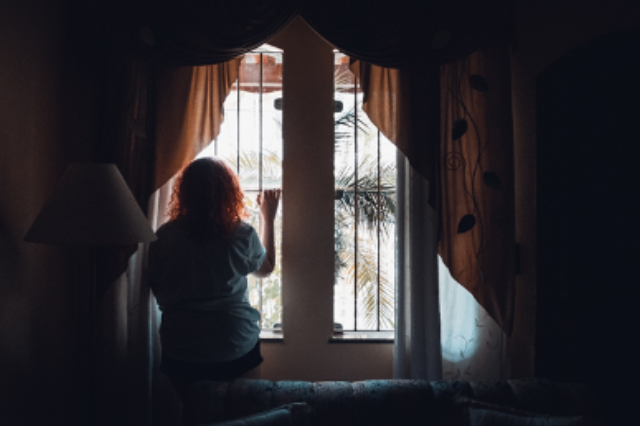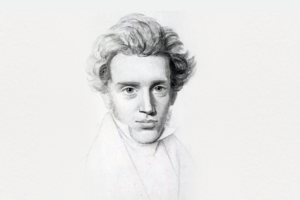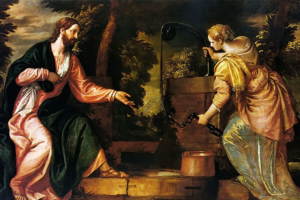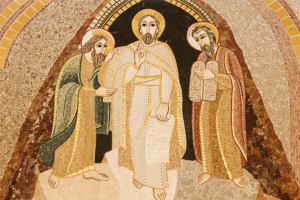Fourth Sunday of Lent
1SM 16:1, 6-7, 10-13 PS 23: 1-6 EPH 5:8-14 JN 9:1-41
If I were to name the single most pervasive form of suffering in the world today, there’s no close second. Loneliness.
What prompted me to think about this recently was a video I came across, “The Voices of the Loneliness Epidemic” from a series of cinematic short documentary films, curated by The Atlantic. In it, you hear real voicemails left anonymously by people across the UK to the newly established Minister for Loneliness; a position created in 2018 to address the public health concern uncovered by the Jo Cox Commission on Loneliness. One of the messages, a young woman by the sound of the voice, describes feeling alone in a place full of so many people, “like I’m the only person who’s not with anyone”. A feeling of isolation amid the masses, a sense of unfulfilled desire for human connection, and human living not unfamiliar to most.
The experience of loneliness is often conflated with the state of social or physical isolation, but its deeper than that. One can be in the midst of others and still feel lonely. It was already a public health crisis with almost half of Americans in modern society experiencing this (not at one time or another but chronically). It’s a major factor in the opioid crisis, rising suicide trends, and can be as “damaging to physical health as smoking 15 cigarettes a day.” This feeling may now be exacerbated as we experience a global pandemic, a phenomenon which might otherwise require closeness to others to buttress foreboding thoughts in the face of such calamitous events.
Granted, this feeling did not arrive on the scene in January of 2020. But now, we are compelled to see it anew through the lens of the newly minted phrase in all our lexicons as of late, ‘social distancing’. In March of 2020 the situation caused by COVID-19 has escalated from promoting good hygiene to social distancing and now to shelter in place as the state of California followed by New York, Illinois and Connecticut issue statewide executive orders to stay at home with some exceptions for critical infrastructure.
The Gospel for this fourth Sunday of Lent offers a word of hope. The Gospel of John recounts the story of the blind man from birth. This reading, like the previous Sunday’s reading is longer than typical Gospel passages from the rest of the year. They, along with next week’s reading comprise the three selections used for the celebration of the Scrutinies each year on the third, fourth and fifth Sunday’s of Lent, even in cycle B and C of the Lectionary.
The readings are aptly selected for their symbolic significance leading up to the Baptism of the Elect, but they are also extraordinarily dense and rich for interpretation. Today’s reading has much to say about the process of coming to know Jesus, the reality of social sin, and the readiness as well as fierceness with which the good works of Jesus are interrogated by the powers that be. For my reflection this week I want to hone in on just one line of the Gospel.
the Gospel is not an abstract reality, a teaching to be known, but a work to be done
Jesus’ disciples ask him “Rabbi, who sinned, this man or his parents, that he was born blind?” (Jn 9:2) They see a man on the floor who is suffering, who’s lot in life has probably always been such since he was born blind. But they don’t really see him, the man, they see a teaching moment. They were ready to walk past a concrete instance of human suffering and simply wax philosophical about it. One of the remarkable things about Jesus in the Gospels is simply that he sees the suffering of others, he sees the one who suffers. He reminds his disciples, the Gospel is not an abstract reality, a teaching to be known, but a work to be done.
“We have to do the works of the one who sent me…” (Jn 9:4) He then proceeds to do something which, every time I read it still shocks me a little, “he spat on the ground and made clay with the saliva, and smeared the clay on his eyes…” (Jn 9:6)
Why does Jesus not just do as he did with the Centurion and heal from a distance, why does he not simply wave his hand or say a word for the blind man to be healed? One reading of this text suggests that the clay Jesus forms harkens to the book of Genesis wherein God creates humanity from the clay of the earth. And Jesus is forming a new creation to be sure, he is healing humanity and building the kingdom- creation anew. But further, I think Jesus is doing something more intimate here.
The sacramental matter or instrument here is saliva. Saliva is a bodily fluid which no one intentionally comes into contact with, in civil society, except those in close intimate relationships that spurn the social boundary- a parent, a child, a spouse. A mother licks her thumb and wipes the dirt from a child’s cheek, a lover shares the personal space of the beloved through a kiss on the lips blurring the distinction, if but momentarily, of my and thy. It reveals something concealed, it brings out something from within.
The healing that Jesus demonstrates is akin to this, he grants not just sight to the blind, but vision to the seeing. He restores the humanity of the blind man who has been ignored and classified as a beggar, more a part of the landscape than a part of our common humanity. But this healing takes place by going beyond just seeing someone, granting momentary attention, it enters into intimacy with that person thereby raising him up into the human experience of familial bonds and social relationship.
The voices in the messages I described above, and the countless unheard voices of those who suffer alone, the faces that go unseen, the bodies that go untouched, all these share something in common with the blind man from birth. We are catapulted into this world as defenseless infants in biological need of touch and affection for survival, we are all in this condition of incompleteness and original solitude, loneliness, from birth. But each of us is also the instrument of healing which lifts others out of that condition as we raise one another into the loving reality of human solidarity, compassion, and relationship. We all suffer from the same debilitation and each of us is the cure for one another.
Ironically the imposed isolation we find ourselves in may be just what the doctor ordered to cure our loneliness. The experience of loneliness is more than being alone, it’s one of not quite being fully actualized, not living life in its fulness, a sense of incomplete or unfulfilled humanity. I find my loneliness heals in the solitude of prayer. The cure is more nuanced than simply being with others. In light of this call from today’s gospel to heal the world, and the need for healing in the current pandemic of the novel coronavirus, I would like to propose five ways to anoint our neighbor and ourselves as Jesus does the blind man.
Slow Down
This time of social distancing, especially for those who are out of school or work even working from home, prompts us to slow down. Many times, I have prayed for respite from the hustle and bustle of everyday life, long commutes in traffic-ridden streets, and back-to-back schedules both mine and those of my loved ones. I did not envision these circumstances, and the immense suffering wrought by this pandemic cannot be understated, but there is always light in the darkness. Myself not being a fan of pious platitudes about silver lining, I cannot avoid seeing this as an opportunity. The normal pace of modern life does not allow for deep conversation, moments of peaceful solitude, the matter of real human connection. Now that many of us have this time, let us not squander it.
Kindness
It’s never a bad time for acts of kindness, but this time, in particular, is calling us to raise the bar. We are called on to be our ‘brother’s keeper’, we prevent the spread of disease not just out of self-interest but out of a deep sense of solidarity with every vulnerable person who we know or do not know, friend or stranger. This is a time to rise above our quotidian egoism and enter into a concerted effort of caring for the wellbeing of others. Reach out to those who are in need, share resources, offer support where needed.
Relationship
Busy lives and hectic schedules have prevented us from establishing and maintaining healthy relationships. We now have the ability to reconnect. We have all recently rediscovered the countless blessings of digital connectivity. But one thing technology and social media has purported to do and failed miserably at is meaningfully connecting people. Take time to listen to the sound of your mother’s voice as it resonates in your ear over the telephone, it will not always be there for you. Soak in the moments shared at the dining table among father and daughter, brother and sister, they are fleeting. Enjoy a date night, attend to your spouse without distractions forgetting about the chaos in the news and outside world for a short time. Apart from the increased bickering of everyone crammed under a single roof for, now, extended periods of time (these too are valuable and essential parts of the family experience), take time to really see one another. They say the time and attention it takes to notice someone’s eye color is what is required for a solid moment of contact. Take a few seconds to notice those things as you gaze upon the face of your loved ones.
The Art of Living
Life is much more than just work! I’ve been putting off brewing my own beer at home for years after receiving a brew kit from my wife as a Christmas gift. Busyness keeps us from knowing that being human is about passion, art, hobbies, food. Read a good book, take up that neglected hobby or passion project and be reminded that life is about more than a productive economy.
Resources
If you are suffering seek help. Don’t fall prey to the idea that things like therapy are tools for the weak. It is weak to avoid taking steps to become healthy and happy. It takes strength to seek to change and grow. There are many such resources available through your local institutions. One such resource which I find helpful in healing this ill of the world is the UnLonely Project. It is a resource for anyone struggling with some of these issues to help find healing through creative expression, public health, science, and culture. Connect with your local parish digitally. They are all scrambling now to go live with Masses, publish websites if they hadn’t already, and inventing ways of doing ministry digitally to make sure you are not alone at this time. Being part of a community of faith is like no other form of connection because it ties us, with our neighbor, to our telos, our true purpose in Christ, and true happiness.
Image credit: Photo by Eric Antunes from Pexels




How fortuitous is it that this pandemic happens when we are living our lent season? For me , lent is the time of year that I feel more connected to my God to my church. I feel the connection all year long but during lent it is stronger and more alive . I am grateful for blogs like this that help me see and experience other point of views . Opens my eyes and broadens my mind to see another side of the many interpretations that the Liturgy has for us . Thank you for sharing with us Ray . This weeks blog Has shown me how much we need of each other not only superficially but intimately, Jesus has opened my eyes to that which was always there but I was not able to see , we need each other but first we have to be right with ourselves and our families so that then we can embrace everyone else and be there for each other. So this lent season may we all grow and unite more intimately with our God and our church. That we may come out of this lent and this pandemic stronger physically and spiritually and as one with our God.